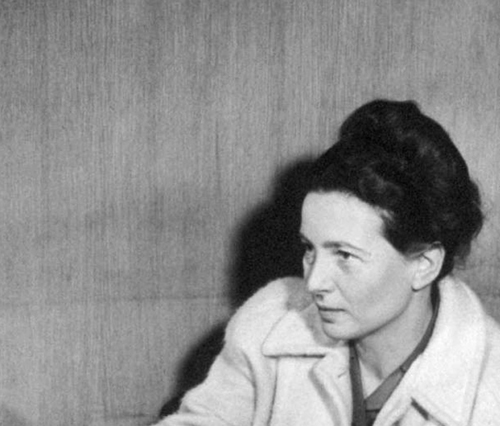
Your complimentary articles
You’ve read one of your four complimentary articles for this month.
You can read four articles free per month. To have complete access to the thousands of philosophy articles on this site, please
Philosophical Haiku
Simone de Beauvoir (1908-1986)
by Terence Green
Forced to be Other
Shaped to suit the ends of Man
Willingly enslaved(?).

Simone de Beauvoir and Jean-Paul Sartre formed the great double act or celebrity couple of existentialism. De Beauvoir was prolific as a novelist, essayist, biographer, critic and theorist, and was energetic as a political activist. She displayed her intellectual gifts from an early age, leading her proud father to boast, “Simone thinks like a man!”
De Beauvoir is perhaps best known for The Second Sex (1949), a work considered to be the pivotal feminist text of the twentieth century. The male, she wrote, has always been portrayed as the norm or standard of what it is to be human. In this way the female has ever been made out to be ‘the Other’, an inferior creation, often with the status of a mere object. To use her (very Sartrean) terms, the male is for-itself, while the female is simply in-itself – the male actively directs his gaze onto the world, while the female is the passive recipient of the gaze. Objectified, and deprived of the potential for self-creation, women are forced to fulfil roles which men determine for them: girl, wife, mother, prostitute…
However, de Beauvoir’s initial analysis of this relationship had little sympathy for the plight of women. She accepted Sartre’s belief that we’re all possessed of absolute freedom – the idea that the ‘slave in chains is as free as his master’. Women, therefore, were essentially responsible for their own slavery: rather than opt for transcendent freedom and the anxiety that accompanies it, they chose instead security, abdicating the burden of freedom.
To her credit, de Beauvoir later decided that this was perhaps a bit harsh, not to mention simplistic, idealistic, and just plain ludicrous. Just perhaps, she later said, individuals may be shaped by their social and cultural contexts, and this may, perhaps, have something to do with how they perceive themselves and their position in the world. What a thought!
Famously, de Beauvoir and Sartre had an ‘open’ relationship; but while each would regard the love of the other one as ‘essential’, their affairs with outsiders would be merely ‘contingent’. De Beauvoir maintained that this suited her just fine – it allowed her the freedom she would never give up. Some have speculated it suited Sartre even better.
© Terence Green 2019
Terence is a writer, historian, and lecturer, and lives with his wife and their dog in Paekakariki, NZ.









